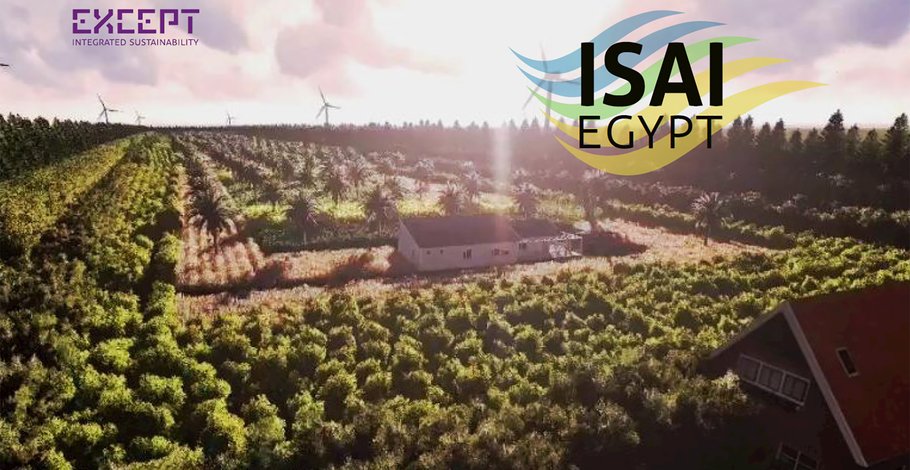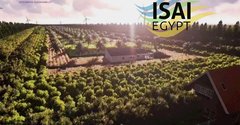
Egyptian Sustainable Agriculture Initiative (ISAI)
Project > Creating sustainable food in the Egyptian Desert
The Integrated Sustainable Agriculture Initiative Egypt (ISAI Egypt) has been started as a response to the pressing need for both ecosystem restoration and regeneration, as well as the need for sustainable food production in arid and semi-arid regions. It is initially aimed at the context of Egypt, in collaboration with the government’s ambition to realize 100.000 feddan (42.000 ha) of sustainable agriculture.
The project is an initiative of a joint venture between Foresight for Development and Innovation (Egypt) and Except Integrated Sustainability (Netherlands), supported by the Ministry of Environment, Arab Republic of Egypt, the Sovereign Fund of Egypt.
ISAI aims to enable this by realizing a nationwide sustainable food industry, which relies on an innovative integration of productive tree plantations, agroforestry, open field, aquaculture, and greenhouse production, powered by 100% renewable energy sources. Fulfilling the ambition of the Egyptian government’s plan, this approach would plant more than 22 million permanent trees, with a high species differentiation.
The project is built from the ground up based on Climate change resilience, adaptation, and mitigating strategies, and focuses on decreasing vulnerability to drought and climate change through intense reforestation. It uses zero-waste management, efficient water management, and increased biodiversity.
The project ties together the entire supply chain necessary for the realization of long term sustainable agriculture, from farmers, planners, designers, agronomists, scientists, policy makers, equipment manufacturers, investors, and regulators. It aims to scale towards over 42.000 hectares of land in phase III, and to enable international expansion beyond this towards other regions.
The first two pilot farms have been conceptualized, one is based on renewable potable water sources, and one based on salt water inputs. Both make extensive use of sustainable agroforestry and tree plantations as a basis, for windbreaks, food production, and beneficial ecosystem interaction. These designs are then scaled up to be rolled out in various regions in Egypt, and ultimately, expanded internationally.
You can endorse the project as part of the One Trillion Trees Challenge here.
CONTEXT
Arid and semi-arid regions struggle on multiple fronts with the resources needed for food production. Populations are growing, while development is increasing, and these both increase the demand for food production and freshwater. At the same time, degrading agriculture practices waste more than 80% of all potable water, and destroys the land for sustainable food production, exhausting them with fossil fertilizers and pesticides. This needs to change, and it needs to change at scale. Using ecosystem-sensitive ways of planting trees, in combination with sustainable water management and agroforestry practices is a recognized way to counter and restore these lands, and provide sustainable food at scale.
This necessity does not go unnoticed. In 2016, Egypt’s president set an ambition to realize a new Egyptian industry for sustainable agriculture. The Egyptian Government has initiated a large-scale reclamation of desert lands [in total 1.68 million ha (4 million feddan) starting with current 0.63 million ha (1.5 million feddan)]. The objective of this initiative is to establish new communities in various areas of desert lands of the country offering new residential areas and job opportunities, where emphasis is laid on agricultural practices and technologies to enhance food security for the ever-increasing population.
Meanwhile, the resource group Foresight for Development and Innovation, led by professor Dr. Hany el-Kateb, and the Dutch innovation and design company Except Integrated Sustainability, led by sustainability innovator Tom Bosschaert, created a joint venture to realize a truly sustainable food production for arid regions. Together, they combine in-depth scientific research with innovative design and farming practices into a new concept for arid and semi-arid food production, as well as an extensive partner network in Europe and Egypt.
In the years to follow, the team of Foresight and Except have expanded the partners, and aim to include those from the start to the end of the realization chain. Current partners include national policy makers, Egyptian and European production industries, scientific and educational institutions, finance partners, designers, engineers, as well as local farmers and farming communities.
The project aims to start with 2 pilot farms in phase I, one farm for a freshwater model at 51 ha, and one farm at 28 ha for salt water production. Water management stands at the forefront of importance of the farms, which is supported by extensive use of agroforestry in the form of tree plantations for protection and management of the farms. These tree plantings are integrated with agroforestry production areas, aquaculture, and combined with embedded smart greenhouses for fresh produce and nutrient cycling. The second project integrates special components to be able to use salt water as a feedstock, and generates its own renewable energy to do so.
The plan embeds around 542 trees/ha for the freshwater farm, and 130 trees/ha for the saltwater farm, in the form of diverse windbreak tree species, fruit trees, and palms. Using this approach to fulfill the Egyption government’s mission of building 42.000 hectares of sustainable farming will lead to over 22.7 million trees permanently planted.
The sustainable integrated farm has been planned to enhance biodiversity and include permanent cultures for climate change adaptation and mitigating and for protective purposes from wind and sand. The selection of crops and products has been based on low technical risk, appropriate crop rotation, strong market appeal and suitability for the prevailing environment.
Phase II is the establishment of larger farms exceeding several thousands of acres across Egypt in select regions. In this phase, the development of the farms, their production systems, the education of staff and knowledge networks are expanded. In Phase III the project is rolled out on a national scale, and prepared for expansion in other arid and semi-arid regions.
MEASURES OF SUCCESS
- The successful realization of phase I, the two pilot farms of 51ha and 28ha, including the planting of over 30.000 trees.
- The proof of financially and environmentally sustainable operations, and full community involvement
- The initiation of scale up in phase II, and phase III to over 22 million trees.
- The realization of a true sustainable forest agriculture ecosystem in Egypt and beyond
KEY MILESTONES
- Achievement of funding for Phase I
- Start detailed design and development on site 1 and 2
- Commencement of farm construction
- Commencement of initial farm operations
- Adjustment and optimization of operations
- Report on financial feasibility and ecological sustainability
- Initiation of Phase II and beyond
Media & Downloads
Contact
Tom Bosschaert
Director
 +31 10 7370215
+31 10 7370215


